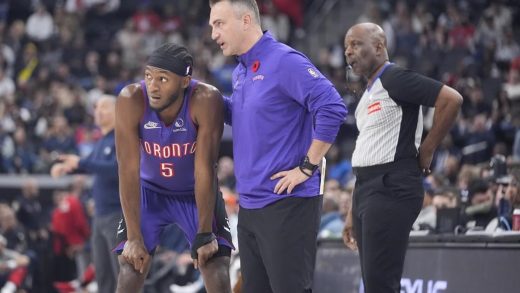Shock and surprise continue at African Cup of Nations

It makes for gruesome reading.
Cameroon — gone. Burkina Faso — gone. Equatorial Guinea — gone. Egypt — gone. Senegal — gone. Morocco — gone. Each of them, having begun the Africa Cup of Nations with designs on a semifinal or final, victims of an absolutely ruthless round of 16.
Add group stage casualties Ghana, Zambia, Tunisia and Algeria to the list and you have a roll call of this ongoing tournament’s stunning brutality.
SUNDAY ALAMBA / THE ASSOCIATED PRESS
Cape Verde’s Ryan Mendes (left) is tackled by Mauritania’s Ibrahima Keita during an African Cup of Nations round of 16 match in Abidjan, Ivory Coast.
Four of its top seven goalscorers are not participating in the quarterfinals — a register that doesn’t even include Mohamed Salah, Sadio Mane, Achraf Hakimi, Riyad Mahrez, Inaki Williams, Mohammed Kudus, Mbwana Samatta and Andre-Frank Zambo Anguissa.
Just two of the continent’s previous 13 champions are still involved; all four of the 2021 semifinalists have been eliminated.
If every upset contains a story, then this cup of nations continues to compile them at such a staggering rate that it is rightfully being labelled the most compelling event in African football history, and one of the best confederational championships, full stop.
Take Saturday’s match between Mali and Ivory Coast (11:00 a.m., beIN Sports), for example.
While not exactly pushovers, Mali’s Eagles arrived at the competition as the Confederation of African Football’s eighth-ranked team, and fourth-best in regional West Africa. They then allowed exactly one goal from open play through their first four outings and on Tuesday overcame 2021 runners-up Burkina Faso.
Cup of nations hosts Ivory Coast, meanwhile, responded to their government’s unprecedented investment in sporting, social and physical infrastructure — all timed to make the event both memorable and legacy-leaving — by falling flat on its face. Embarrassed by a 4-0 loss to Equatorial Guinea in the group stage, they sacked their manager, snuck into the knockouts and proceeded to send reigning champions Senegal packing.
One of them will contest a semifinal on Wednesday in Abidjan, where they’ll face DR Congo — already vanquishers of record champions Egypt.
The Leopards didn’t even qualify for the last cup of nations, and with a world ranking of 64th — 12th in Africa — they certainly weren’t expected to make an impact at the current one. So, naturally, they did. And are. And how.
With three group stage draws and their defeat of Egypt on penalties, DR Congo entered its quarterfinal with Guinea having yet to win a single match in Ivory Coast. After falling behind after just 20 minutes, it appeared as though they weren’t going to. Then Marseille defender Chancel Mbemba scored a goal any striker would be proud of, Yoane Wissa converted a penalty and Arthur Masuaku floated a lucky free kick into the back of the net.
Their semifinal against either Mali or Ivory Coast will be only the third they’ve played as DR Congo. They last won the trophy in 1974 as Zaire.
On the other side of the draw, Nigeria — the only surviving heavyweights from the round of 16 – have somehow managed to evade the theme of the past few weeks and elude the sort of upset that has proven so costly to so many of their co-contenders. At least, so far.
Having failed to impress in a Matchday One draw with Equatorial Guinea, they required penalties to see off each of Ivory Coast and Guinea-Bissau before quietly entering the knockout rounds as Group A runners-up.
Cameroon, champions in 2017 and another traditional favourite, might have represented a threat in the round of 16, but the Super Eagles delivered their best performance to date at Le Felicia, winning 2-0.
Ademola Lookman scored both goals against the Indomitable Lions, and got another in Friday’s quarterfinal triumph over Angola. Napoli marksman Victor Osimhen had been expected to deliver Nigeria’s offence in Ivory Coast, but Lookman, who was part of England’s Under-20 World Cup-winning team in 2017, has proven the hero of his parents’ birthplace in his first Cup of Nations.
Now, given the catastrophes that have already befallen seven of Africa’s top 10 teams at this tournament, a Nigerian victory (it would be their Ghana-equalling fourth) would seem to be at once too obvious and too anticlimactic.
Enter Cape Verde and South Africa.
One of the first signs this competition might be a bit unusual came when Cape Verde beat Ghana 2-1 on the second day of the competition and never looked back.
After holding Egypt to a thrilling draw in Abidjan, they edged Mauritania — surprise conquerors of Algeria — through a goal from 34-year-old Ryan Mendes, who plays his club football in Turkey.
All told, the Blue Sharks represent clubs from an astonishing 16 countries, from Cyprus and Azerbaijan to Ireland and the United States. That they’ve come together so quickly and effectively in less than a month speaks well to their coaching staff — to a man, incidentally, Cape Verdean.
They might even be tipped to beat South Africa Saturday in Yamoussoukro (2:00 p.m., beIN Sports).
Largely unsuccessful at international level this century, Bafana Bafana’s Cup of Nations looked to be headed for its customary quick conclusion when they kicked it off with a feeble 2-0 loss to Mali. But they responded by beating Namibia 4-0, and their draw with Tunisia relegated the Carthage Eagles to the bottom of Group E.
Then they stunned Morocco in San Pedro.
If there’s a single team that might embody what this competition has become, it’s South Africa. Or maybe DR Congo.
Between the two of them they prevented the widely-anticipated dream final of Egypt-Morocco. They might even replace them in next Sunday’s final.
Though, at this point, at this upside-down Africa Cup of Nations, even that might be too predictable.
X @JerradPeters
Credit: Shock and surprise continue at African Cup of Nations


